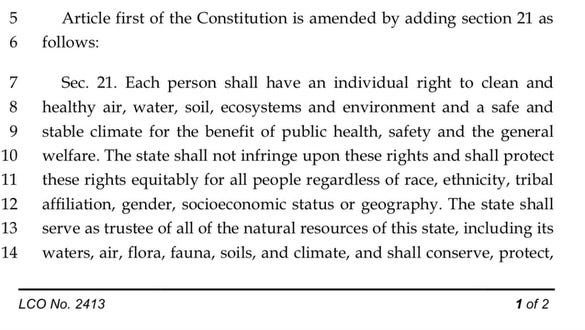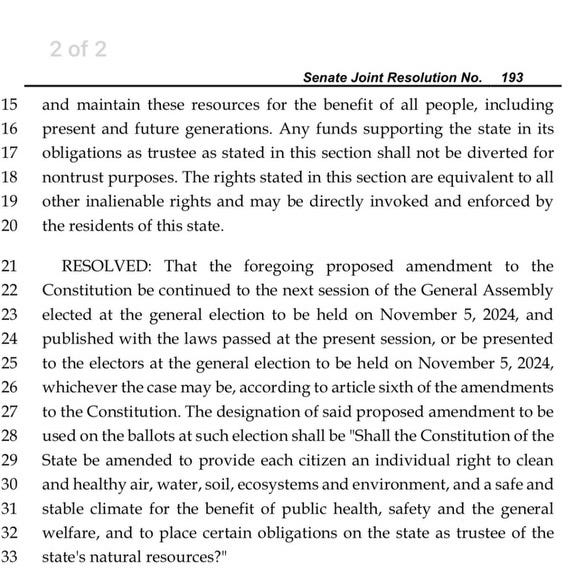Connecticut Senate proposes Constitutional Amendment designating State as Trustee of natural resources
The proposal makes the State of Connecticut responsible for ensuring its residents get compensated when the environment is damaged
A recently proposed Amendment to Connecticut’s State Constitution has drawn criticism, as some have interpreted the language of the proposal to give the State ownership over all land and resources within its borders.
However, after some digging, it seems that interpretation isn’t exactly representative of reality.
This provision is intent on ensuring citizens of CT have clean air to breathe, clean water to drink, and an overall healthy environment to live in.
For all intents and purposes, a guarantee that your land won’t be polluted, your air will be safe to inhale, your water ways are conducive to a thriving ecosystem, and you will be compensated accordingly if it’s not, is something to be excited about! Who wouldn’t want that?
This proposal would designate the State of Connecticut as the “Trustee of all natural resources.” They did list them, so I’ll do the same.
including its waters, air, flora, fauna, soils, and climate, and shall conserve, protect, and maintain these resources for the benefit of all people, including present and future generations.
What is a trustee?
The trustee acts as the legal owner of trust assets and is responsible for handling any of the assets held in trust, tax filings for the trust, and distributing the assets according to the terms of the trust.
What is a State Natural Resource Trustee’s purpose?
A State Natural Resource Trustee’s purpose is to act on behalf its beneficiaries — in this instance it would be Connecticut residents — to ensure the integrity of natural resources, and that its beneficiaries can obtain monetary damages for any natural resource related injuries, amongst other duties.
This would give Connecticut the power to intervene on behalf of its residents to take whatever actions it deems necessary to safeguard natural resources within the confines of any already existing statutes or regulations.
This essentially means that the State frees the individual of responsibility for suing entities or individuals who are responsible for any damages that may have incurred as a result of that entities negligence or intentionally harmful actions.
Some states already have trusteeship over various resources, where the responsibility is vested in the Governor. In those instances, the Governor would use executive action to establish a Natural Resource Management Program (or something similar), and appoint someone as the Trustee, who would then manage and oversee the execution of the duties vested in that office. It varies from state to state. Here is a link that breaks down State Resource Trustees from state to state.
The Governor of New Mexico recently appointed a Natural Resource Trustee back in 2019. Here is a video of her explaining what her duties are.
Now there is debate regarding the privatization of stewardship over natural resources versus giving the State this responsibility, and whether one is more or less conducive to promoting sustainability and conservation goals.
In all fairness, I can understand the desire to keep the Government’s tendrils out of our lives. I generally share in this sentiment.
So, I’ll simply pose this question.
Who do you trust more… the Government, or a profit maximizing corporation?






Hmmm. Not sure if I look at this as good or bad lol
I trust the one who doesn't have an army and hasn't enshrined itself as a baby murdering sanctuary.